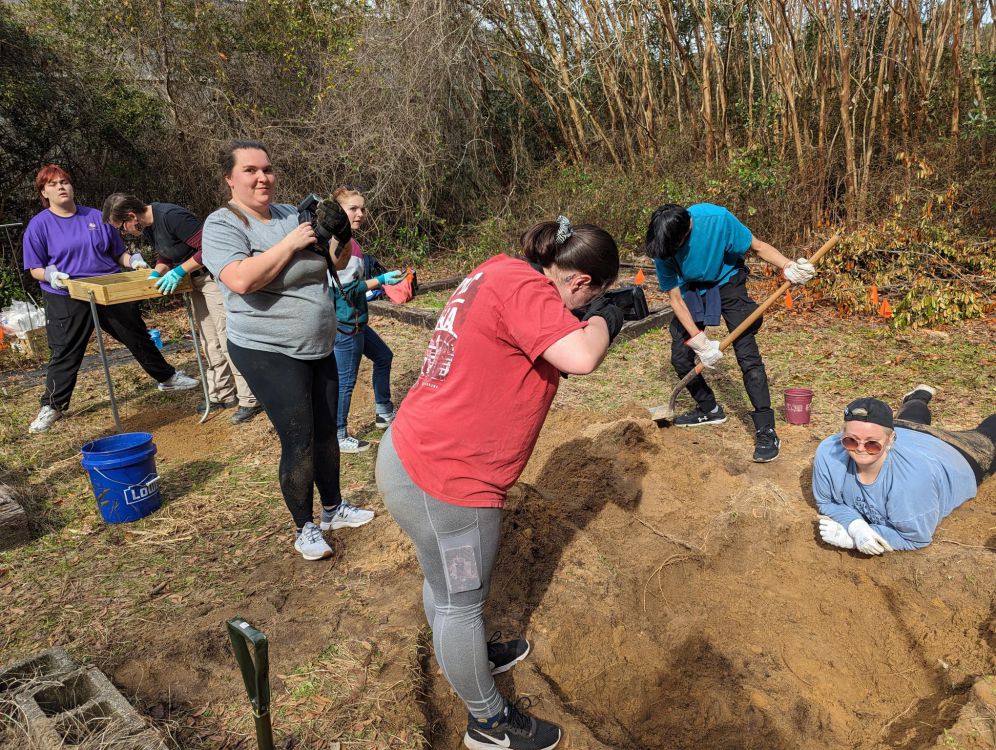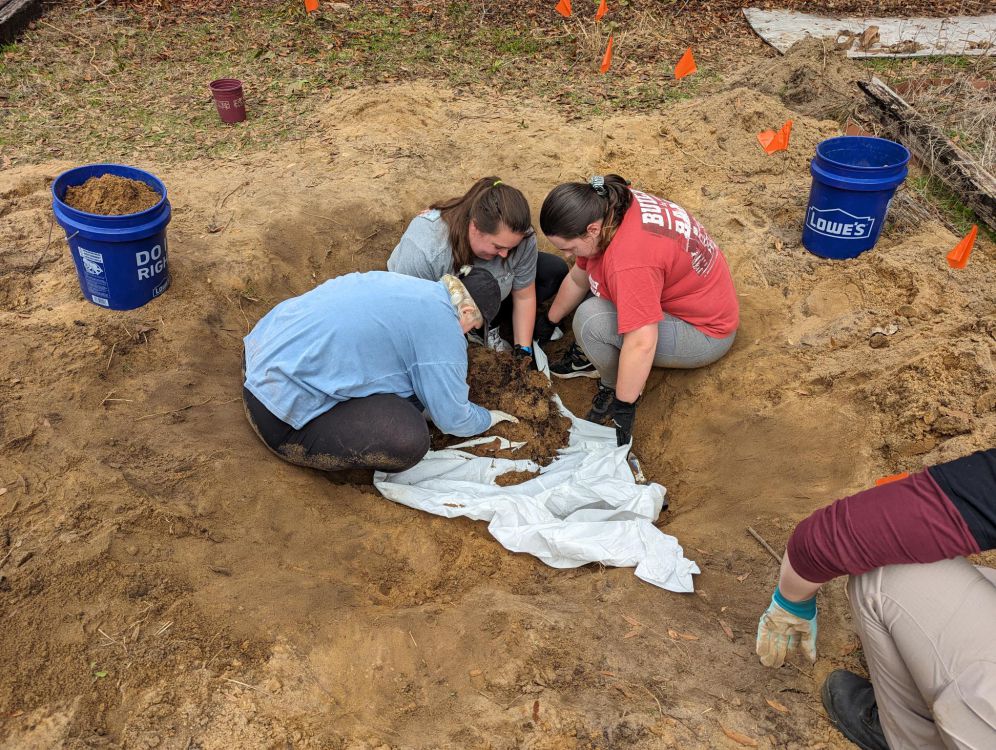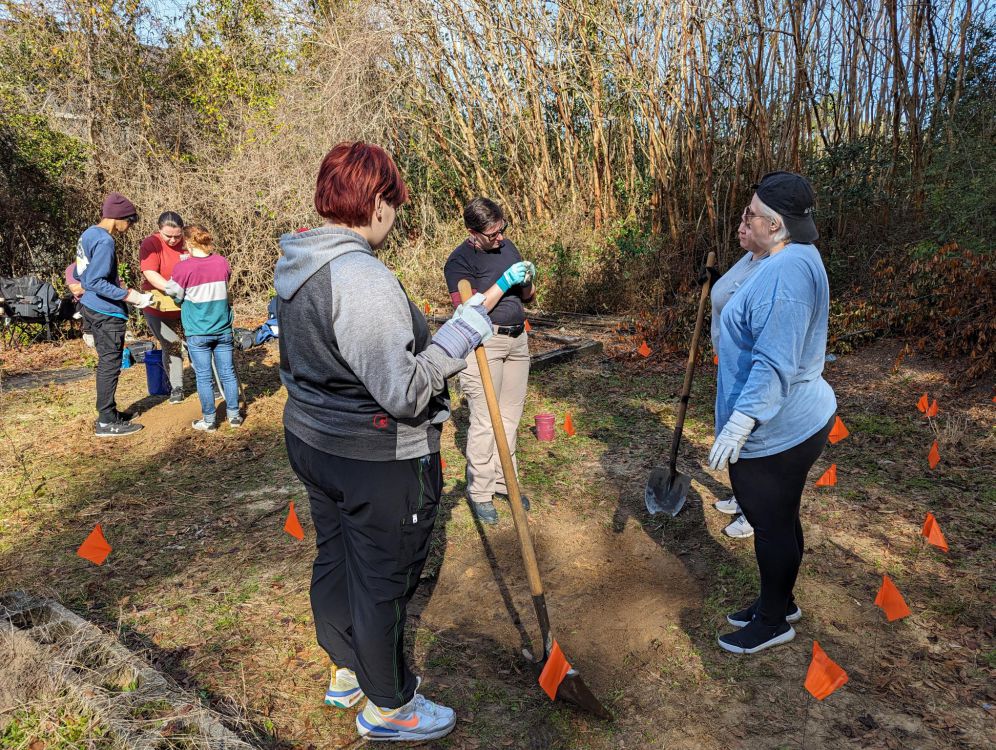


Tori Wallace never imagined she would enjoy spending a Saturday digging up and examining a pig carcass.
“The smell didn’t bother me, but it was a great assignment for students in the program because of the hands-on experience,” said Wallace, one of several Pensacola State Crime Scene Technician Certificate Program students to participate in the 2024 Pig Dig held Feb. 1 on the Milton campus.
“During a lecture, you just don’t experience as much detail as we did during the pig dig.”
The Crime Scene Technician Certificate enhances career opportunities for students in the program and those earning a Criminal Justice Technology (LAW-AS) degree. Crime scene investigators collect, inventory and document evidence found at crime scenes. Investigators also testify in court about the evidence’s probative value and link to the defendant(s).
“The pig excavation simulates the recovery of a buried body. The students can employ the same practices they would in searching for a clandestine grave through recovering a buried pig,” explained Taryn Emswiler, the program instructor and a Florida Department of Law Enforcement crime scene specialist.
“This would include locating the remains of a victim to the actual excavation of one,” she said, adding the pig dig is similar to the work conducted at the University of Tennessee Knoxville Forensic Anthropology Center, more commonly known as The Body Farm.
For Gloria Caron, the pig dig was personal.
“My aunt Carol was murdered in 1972, and it’s a cold case because the crime scene was not processed properly,” shared Caron. “It was an extremely brutal and gruesome murder, and I remember how badly that hurt my family. I imagine there are other cases and families out there suffering. I want to be someone who can help other people find closure and justice for their loved ones. That’s my motivation!”
Caron, 27, hopes to eventually work for the Escambia, Santa Rosa, or Okaloosa County Sheriff’s Department. Her long-term goals include earning a doctorate in forensic pathology.
Wallace and Caron said Emswiler prepared students for the pig dig, and they knew what to expect.
“We knew it wouldn’t be a fresh pig, and there would be bones, and that it would be labor intensive,” Wallace said, adding the pig dig started about 8:15 a.m. and ended around 2 p.m. “Our first goal was to find the body in an area about the size of a college classroom. We used probes to feel the ground before locating it.”
Caron added the students located the carcass at the very first dig site, and she was the first student to scrap hair off the remains.
“I expected the pig to be nothing but bones, but I kept finding surprises. …It takes a little bit of elbow grease when you are at the site, but I enjoyed the camaraderie during the excavation,” Caron said, noting the students removed all pig remains from the ground at 11:53 a.m.
Wallace, 24, has yet to decide on a career. After earning her Crime Scene Technician Certificate, she plans to transfer to the University of Alabama for a bachelor’s degree in criminology.
“This class has prepared me more for my future goals,” said Wallace, who has earned an associate degree in criminal justice (advising track) from PSC. “At first, I was looking toward a career in law enforcement, but now my options have broadened.”
Dr. Michael Payne, head of the College’s business department, said this is the second “annual” spring semester pig dig. Other pig digs have been held on the Warrington campus and with the Santa Rosa Sheriff’s Office.
“Students pursuing the Crime Scene Technician Certificate excavated a pig during the 2023 Spring semester. We are trying to make it an annual part of the curriculum to give the students more hands-on experience,” Payne said.
The 2-year-old pig (used in the dig) was donated to the College by an employee and buried in March 2023.
Marc Ward, an associate professor in the business department, said the students were following discipline-accepted protocol for searching and recovering a buried body during the pig dig.
“There is nothing strange about excavating and recovering a cadaver for students looking to pursue a career in Crime Scene Investigation,” he said. “The students recovered the pig, discussed the various stages of decomposition the remains were in, and then placed the remains back into the ground for a future semester in case a fresh pig could not be obtained.”
Caron gave a “shout out” to Payne, Emswiler and Ward for the opportunity to participate in the excavation.
“You guys are doing a great job in ensuring we are learning what we need to become well-rounded students,” she added.

 PirateQ
PirateQ 